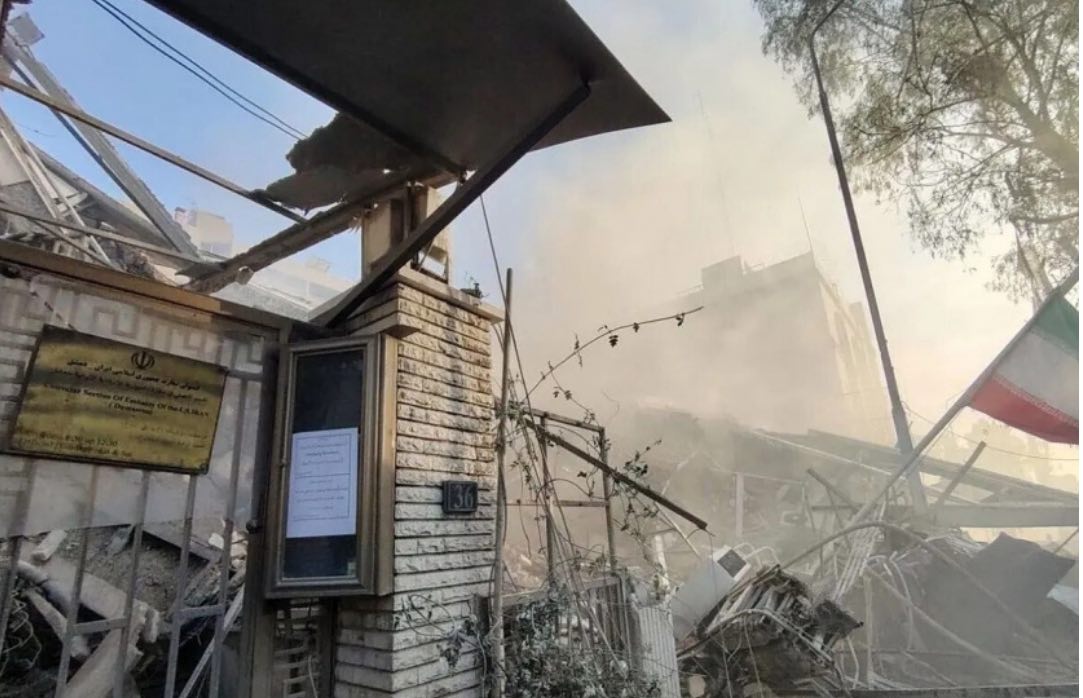The goal of Israel in attacking the consulate of the Islamic Republic of Iran
Israel’s goal in attacking the consulate of the Islamic Republic of Iran crossed another red line by attacking Iran’s diplomatic compound. This attack is seen by Iran and many other governments as an attack on Iran’s territory. This attack likely indicates that the Israeli government believes that the time to act against Iran’s military objectives, whatever they may be, has come and that they can relatively withstand the consequences.
From Israel’s perspective, Iran is currently restrained to the extent that it cannot react in a way that would ignite a regional war. This means that, from Israel’s point of view, the Gaza war has not only limited its maneuvering space against Iran and its allies but has also expanded it. If this is the case, Israelis may have underestimated the current regional atmosphere. This attack may be a confirmation of a dangerous miscalculation that is not only harmful to Israel but also to the entire region.
The nature and strategy of Israel’s attacks over the years have shifted from focusing on hitting Iran’s weapon shipments to a more targeted campaign of killing operational and intelligence leaders of the Iranian network, including an increasing number of senior Iranian military personnel. In fact, the recent attack continues the same pattern of Israeli strikes on valuable Iranian targets in Syria and beyond in recent months.
Following the October 7th attack, Israel could limit its regional campaign against Iran and focus on immediate threats emanating from Gaza, especially since Hezbollah in Lebanon did not show any inclination to join Hamas in war. Israel could align its regional campaign with the increasing fragility of the region, particularly with the strong desire of the U.S. to contain war and avoid direct confrontation with Iran, an approach also prioritized by Israel’s Arab neighbors.
It seems that Netanyahu and his emergency military cabinet have chosen a different path. Six months after the start of the Gaza war, Israel intensifies its regional campaign. This move is a logical consequence, something Naftali Bennett labeled as ‘kicking the eight-foot doctrine’ in 2018. Israel believes it is necessary to confront Iran directly and not rely solely on proxy forces.
Following this strategy, Israel must hold Iran accountable for its regional semi-military actions, even if Iran has varying degrees of control over this decentralized network. The Israeli public strongly supports this approach, as do various political factions.
Some observers believe that Israel is trying to provoke Iran into entering a war. However, the opposite logic may be correct. Israel is conditioning on Iran being restrained and cornered because it is concerned about retaliatory actions that could provoke direct Israeli attacks on its territory. Currently, Israel sees Iran in a politically and economically vulnerable position, even if some analysts believe that through the Gaza war and closer military alignment with Russia, Iran has become stronger.
Since the assassination of Qasem Soleimani in 2020, policymakers and analysts have raised questions about Iran’s ability to respond to attacks. A prevalent discourse in Israel is that the killing of General Soleimani showed that Iran is a paper tiger. Despite vowing to avenge Soleimani, Iran did not take significant action. On the contrary, it is argued that Soleimani’s assassination fueled Iran’s pursuit and threat against Israel and the US. The increased capabilities of armed groups supported by Iran in recent years indicate that killing Soleimani did not fundamentally hinder these actors’ ability to inflict significant harm across the region.
However, Israel is not mistaken in its interpretation that following Israel’s attacks in Syria and Lebanon in the past six months, Iran and Hezbollah have not done much in retaliation. Israelis possibly see this moment as an opportunity to further weaken Iran and its regional allies, especially given their full support from Washington and the understanding that the world is against them.
Israel may be confident that it can break boundaries without Hezbollah or Iran engaging in direct warfare. In other words, Israeli escalation of military attacks may not aim to provoke Iran into direct war, but rather to pressure Iran to step back. Similar logic could guide Israel’s assessments regarding Washington.
Israel may believe it can shift the boundaries of military escalation because it expects the US to stay on its side or even provide tactical support for Israel’s actions against groups that also threaten Washington’s interests. Israel, with the belief that it is striving to weaken Iran and its proxies with some limitations, takes a significant risk. Iran’s government may feel compelled to react directly at a certain point, facing increasing pressure internally for such a response.
Perhaps Israel may see such risks as manageable, but the growing sense of invulnerability is not the only risk for Israel. This is a dangerous approach that could directly jeopardize the interests and lives of Americans. It seems that the Gaza war has only strengthened Israel’s already strong motivations for further military escalation with Iran. Israeli leaders, both before and after the Gaza war, acted within this mindset that engaging with Iran could remain limited, while Israel could pursue its goals of weakening the Iranian axis.
At the same time, improving its relations with Arab countries that are wary of Iran could be beneficial. This mindset showed its inaccuracy even before the Gaza war, but during the ongoing onslaught on Gaza and the unimaginable scale of killing Palestinian civilians, Israel is playing with fire. There is a danger that Israel may end up paying a heavier price than anticipated for these attacks, and in such a scenario, it is likely that America would also pay a price.
Persian
مشاهده این مقاله به زبان فارسی


